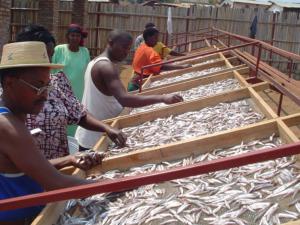An estimated 150,000 tonnes of fish waste in the country that rots in the sun every year is to be turned into 100 percent organic fertiliser by a venture known as the Post Harvest Project.
Fish heads, bones, fins, scales, tails, gut-waste and fish oils make up a massive amount of waste, most of which is not put to productive use in the country.
The project will be buying fish waste from Tropo Farm, a large tilapia farm on the Volta River with an annual production of 6,000 metric tonnes, as well as several other fishers and fishmongers.
The Post Harvest Project has secured the rights to purchase up to 15,000 tonnes of fish waste for between US$0.18 to US$0.25 per kilogramme (US$180-US$250 per metric tonne).
The project is an initiative of Craig Rominger, an American agricultural business developer, who is in the country laying the ground for take-off.
The project will utilise technologies that provide environmentally safe organic fertiliser from fish waste and extract nutrients from food by-products that would have been thrown away.
It is expected to enable farmers, ranchers and fishers to preserve the freshness of their food products, increasing the edible utility from 20 percent to as much as 80 percent.
Together with its technology partner EcoGroup Ghana, the project -- starting as a not-for-profit to make it cheaper for farmers to access the fertilisers -- is in the process of setting up a plant in the country to manufacture the liquid fertiliser.
The first phase of the project is expected to create about 300 direct jobs, Mr. Rominger said.
“ECO Group can build profitable fertiliser factories (as small as 360,000 gallons or 1.2 million litres of liquid fertiliser) that are able to serve 20,000 hectares of farmland. These factories are expandable up to 5 million gallons (15 million litres) without requiring significant investment or additional manufacturing space.”
The fertiliser, said to improve crop yield by 10-30 percent per hectare, will be sold for approximately 20-25 percent less than inorganic fertilisers.
Mr. Rominger said Ghana was chosen as the launch-pad for an Africa-wide roll-ut of the project based on the country’s superior score in about 28 indicators, including business climate, education, among others.
‘All of our chosen technologies are scalable and replicable anywhere in the world,’ he said, adding that the project is working on proving that its fertiliser can indeed boost crop yield through a demonstration cocoa farm located near Dunkwa-on-Offin.
“We have a comprehensive plan and we want to start with cocoa; then we can move to every other crop,” Mr. Rominger said.
Nana Agyeman Larbi of Kwesi Donko and Company, who owns the cocoa farm, said the project could not have come at a better time in view of the many challenges facing cocoa farmers in the country.
Business News of Sunday, 13 July 2014
Source: B&FT
Fish waste to turn out tonnes of organic fertiliser
Entertainment












